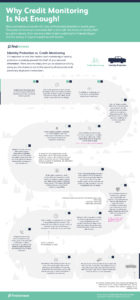Recently, there have been several data breaches across the U.S that’s leaked the personal information of thousands of clients of several different companies. Each data breach left consumers vulnerable to identity thieves who could ruin their good name and put them in financial despair.
Alongside those data breaches, you’ll find thousands of people who’ve become victims of identity theft. They give horrifying details on how difficult it was to reclaim their name and financial stability, if at all. If you’ve read these stories or experienced a data breach, you’re probably considering a service like identity protection or credit monitoring.
Unless your familiar with these services, you might not know which one to choose. While they both offer their own benefits, they have a vast set of differences you should know about. This article is here to help you keep your personal information safe by showing you why credit monitoring alone isn’t enough.
Identity Protection vs. Credit Monitoring
It’s important to note that, neither credit monitoring or identity protection prevents identity thieves from stealing your information. They merely alert you of suspicious activity and rely on you to report and act on inaccurate information.
With that being said, both identity protection and credit monitoring services offer valuable benefits if you want some type of protection against data breaches or cybercriminals. However, they have distinct differences that impact the level of financial security you’ll receive.
What Are Credit Monitoring Services?
Credit monitoring services give you access to your credit report, allowing you to check it as many times as you like. Some companies offer this service for free, while other companies charge a small monthly fee for additional credit monitoring services.
Most credit monitoring companies alert you to changes made on your credit reports from Transunion, Experian, and Equifax. Depending on the service provider, you’ll receive alerts from one, two, or all three of the credit reporting bureaus.
What credit monitoring alerts you to includes:
- Changes to your personal information including addresses, name, and phone number
- New public record entries, such as bankruptcy, court cases, or any tax liens in your name
- Changes to your credit accounts, such as late payments, account balances, and payment history
- Any new bank accounts, credit card accounts, or personal loans that have been opened in your name
- Hard inquiries that indicate a financial institution has checked your credit report for an application
Once a change occurs on your account, the credit monitoring company will notify you within 24 hours via an email, phone call, or text message. This allows you to check the accuracy of these changes and take immediate action if these changes weren’t made by you.
With credit monitoring services, you can dispute inaccurate information, freeze your credit usage, and get contact information to the creditors who have a suspicious account opened in your name.
In addition to monitoring your credit report, you’ll also have access to your credit score. Your credit score reflects the health of your credit and determines the likelihood of a financial institution doing business with you.
What Are Identity Protection Services?
Identity protection offers both credit report and credit score monitoring, with additional services stacked on for extra protection. These services typically offer a free trial for new users but often require a monthly fee to continue. The price of identity protection costs anywhere from a few dollars to $30 a month.
While identity protection companies offer the same services as credit monitoring companies do, they also monitor for suspicious or fraudulent activity that may occur in other places. Identity protection providers will keep an eye out for any unauthorized use of your name, address, social security number, and more.
Identity protection services monitor for:
- New court cases or arrest records in your name
- New utility, cable, or wireless services in your name
- Use of your SSN for payday advances or personal loans
- Use of any of your personal info on the Dark Web
- Fraudulent or unauthorized bank account transactions
- Requests for a change of your address with the USPS
Once a change appears or suspicious activities are detected, you’re notified in real-time. This allows you to put the proper steps into place to prevent further fraudulent activities from occurring. Identity protection services allow you to dispute inaccurate or suspicious activity, freeze your credit report, and also gives you tips on how to better protect your personal and financial information.
Why Credit Monitoring Alone Isn’t Enough
While credit monitoring is ideal if you’re looking to improve your credit score or to monitor changes made to your credit report, it doesn’t offer the best level of protection. Many credit monitoring providers only watch for changes on one of the credit bureaus. This means if any activity occurs on the other two credit bureaus, you won’t receive an alert notifying you.
Even if your credit monitoring service provides access to all three credit bureaus, you still won’t get protection from cybercriminals. Many times, there will be fraudulent activity doesn’t appear on a credit monitoring report. You won’t know if someone uses your private data to open a phony bank account, for example.
And if your identity is stolen, you won’t get any help from a credit monitoring service. You’ll be left to figure it all out on your own. But if you’re covered by top-rated identity protection services, you can rest easy knowing you’ll not only get the help you need, but you’ll also be reimbursed for stolen funds.
Is Identity Protection Worth the Cost?
Identity protection services feature two important parts of coverage: prevention and recovery. The prevention aspect focuses on alerting you of suspicious activity or fraudulent accounts, as well as tips to help you better protect your information when using online platforms.
Unlike credit monitoring companies, identity protection companies monitor platforms outside of the three credit bureaus. This additional protection includes checking the National Change of Address database, social media platforms, tax returns, and black market websites where thieves exchange stolen information.
Identity protection providers also use more information in their protection process than credit monitoring services. They monitor uses of your name, social security number, physical and mailing addresses, and your driver’s license number. By using different types of information, identity protection companies can detect more fraudulent activity than credit monitoring services.
How Does Identity Protection Work?
If you’re signed up for identity protection and receive an alert of suspicious activity, it’s important to act fast to keep yourself safe. Most people have no idea what to do if they’re identity is stolen, which is where the recovery aspect of identity protection comes into play.
Once you’ve been alerted of possible identity theft, you need to call the trained counselors at your identity protection company. They’ll discuss the issues you’re facing and the steps you need to take to recover your identity. Your counselor will work hard to help you get back on track and prevent financial ruin.
Your identity protection counselor can put a freeze on your credit report, preventing any other accounts from being opened using your information. In addition, they’ll guide you through the process of reviewing important documents and help you write letters to your creditors. If you give them permission, they’ll go a step further by dealing with creditors on your behalf, if you’re not comfortable doing it yourself.
Another important part of the identity theft recovery is reimbursement of any stolen funds. The best identity protection providers will not only help you get back what was taken from you, but they might also cover certain out-of-pocket expenses you incurred due to identity theft.
Common out-of-pocket expenses covered by identity protection services include:
- Postage
- Notary services
- Copying services
Less common out-of-pocket expenses covered by identity protection services include:
- Lost wages due to missed work that was a direct result of identity theft
- Legal fees associated with obtaining a lawyer or attorney and court costs
The identity theft insurance coverage you receive depends on the provider’s insurance policy. Some providers require you to pay a deductible and they all have their own exclusions or limitations. Be sure to do your research to find the best identity protection service for you.
How Do I Fix Identity Theft?
Identity theft is a serious crime that has devastating consequences to its victims. It prevents you from obtaining the financial backing you need to purchase a home, buy a car, and in some cases, can keep you from getting a job. It could also cost you thousands of dollars if thieves gain access to your existing accounts, taking the money you’ve earned with your hard work.
Unfortunately, once you become a victim identity theft a long, arduous process to recover from. The amount of time it takes to resolve an identity theft case ranges from seven to 1,200 hours over the course of a year.
But if you’re able to detect an issue and work to resolve it quickly, it will take less time to recover your identity theft losses. If it takes you months or years to detect and act on a fraudulent account, you can expect the process to take much longer. This is why identity protection is so important!
Another factor that determines how long it’ll take to resolve a case is what type of theft occurred. If there’s an unauthorized transaction on your existing account, it’ll take less time to correct than if you have several new accounts opened under your name. New existing accounts also leave you open to legal consequences if you don’t detect them on time, leaving you to spend more time working to resolve your case.
What Are the Costs of Identity Theft?
Depending on the severity of your case, you may end up needing an attorney, which not only prolongs the process but could cost you thousands of dollars in fees and court costs. Unfortunately, that’s not the only cost commonly endured due to identity theft. Many times there are out-of-pocket expenses you’ll pay for like postage, copying, and notary services and you could miss work during the process of solving your case.
Another cost of identity theft is the money that’s taken from your existing accounts. Since you won’t receive that money back unless your case is resolved, you may need to borrow money from family and friends to get by in the meantime. In some cases, that money may never be recovered, or it could take up to a year before you get it back.
Without any type of protection against identity thieves, you could end up spending hundreds of hours trying to get your life back. You also stand to lose thousands of dollars from existing accounts, only to spend more money trying to resolve your case. Not to mention the emotional stress that identity theft has on its victims.
How to Protect Your Bottom Line
If you’re faced with the choice of identity protection vs. credit monitoring, we highly recommend going with the more robust coverage that comes with identity protection services. While credit monitoring allows you to keep an eye on changes made to your credit report and help improve your overall score, it doesn’t offer the same level of service as identity protection.
It’s no wonder that credit monitoring isn’t enough to keep you safe! Identity protection will prevent you from becoming the victim of identity theft and keep your bank account in the black. You’ll get all the features that come with credit monitoring services, plus so much more when you sign up with one of the top identity protection providers.

